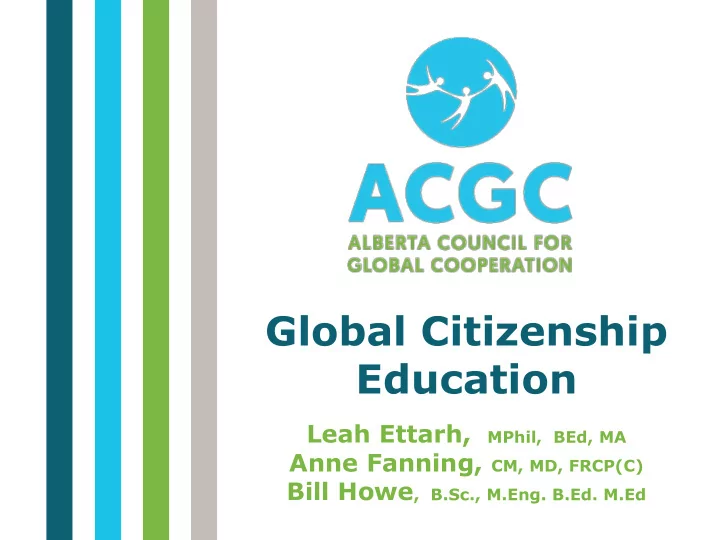

Global Citizenship Education Leah Ettarh, MPhil, BEd, MA Anne Fanning, CM, MD, FRCP(C) Bill Howe , B.Sc., M.Eng. B.Ed. M.Ed
The Alberta Council for Global Cooperation www.acgc.ca The Alberta Council is a coalition of over 60 organizations located in Alberta, committed to international cooperation and global citizenship. ACGC supports the education sector through providing: ● Local and global connections inside and outside the classroom ● Youth and Educator opportunities ● Curriculum-aligned resources and support ● Professional Development opportunities
Objectives ● Remain a leader in Global Citizenship Education within Canada and around the globe through furthering a progressive understanding of global citizenship education ● Include a global citizenship perspective throughout all subject areas and disciplines ● To strengthen the curriculum through promoting deeper, and more critical understanding of local and global issues
Key Readings and Research Support Global Citizenship Education: Topics and Learning Outcomes UNESCO Education Research and Foresight, Paris. 2015 . Education for ‘Global Citizenship’: A framework for discussion . UNESCO Education Research and Foresight, Paris. [Tawil, s. (2013). The National Youth White Paper on Global Citizenship Education The Center for Global Education (EPSB), The Center for Global Citizenship Education and Research (UofA), TakingITGlobal. 2015 Critical Global Citizenship in Theory and Practice: Rationales and approaches for an emerging agenda . Karen Pashby and Vanessa de Oliveira Andreotti Research in Global Citizenship Education, Chapter 2, 2015 Social Justice at the Heart of Public Education CTF Monogram and the Service-Learning Program . 2015. Dr Darren Lund. University of Calgary. Decolonizing Global Citizenship Education Ali A. Abdi, Lynette Shultz and Thashika Pillay (Eds.)
Global Citizenship Education in Alberta 2007: Alberta became the first province in Canada to mandate global citizenship in its curriculum 2013: Ministerial Order on Student Learning: emphasis on ‘Ethical Citizens’ and ‘Engaged Thinkers’ 2016 : The Guiding Framework: Vision for students, as inspired “to contribute to communities and the world,” 2016: The supplemental descriptions of the 8 competencies: Cultural and Global Citizenship
What is Global Citizenship Education?
Defining Global Citizenship Global Citizenship is an ethos , a way in which to see the world . It refers to a sense of belonging to the global community and common humanity , with its presumed members experience solidarity and collective identity among themselves and collective responsibility at the global level. UNESCO: Global Citizenship Education: An emerging Perspective ED/2013/PSD/PHR/PI/4
Trends in Global Citizenship Education From this To this Knowing about the world Being a global citizen Equality Equity Charity (giving) Social Justice (righting wrongs) Serving Others Working in Solidarity Addresses symptoms Addresses root causes Single Story/ Single History Multiple Stories/ Multiple Histories Focus on sympathy Respects human rights
Domains of Learning and Key Learner Outcomes Global Citizenship Education: Topics and Learning Objectives UNESCO 2015 Cognitive Socio-Emotional Behavioural To acquire To have a sense of To act effectively knowledge, belonging to a and responsibly at understanding and common humanity, the local, national critical thinking sharing values and and global levels about global, responsibilities, for a more peaceful regional, national empathy, solidarity and sustainable and local issues and and respect for world the differences and interconnectedness diversity and interdependency of different countries and populations
Domains of Learning and Key Learner Outcomes Global Citizenship Education: Topics and Learning Objectives UNESCO 2015 Cognitive Socio-Emotional Behavioural
Cognitive Students will examine the roles and responsibilities of governments, civil society, and the private sector in encouraging sustainable development that takes the environment, economy, human rights, and social justice into account.
Cognitive Students will understand the history and legacy of colonialism, and the effects of neocolonialism, on Indigenous peoples and marginalized communities in Canada and across the globe.
Cognitive Students will understand the risks and impacts of climate change on vulnerable populations, examining how communities adapt, build reliance, and reduce their risks of climate-related disaster in Canada and across the globe.
Socio-Emotional Students will recognize, understand, respect and value human differences within a pluralistic society.
Socio-Emotional Students will have a sense of belonging to a global community with a common humanity, with universal rights and a collective responsibility to actively contribute to a sustainable world for all.
Socio-Emotional Students will understand their own identity and be able to place themselves within local and global structures of power and privilege.
Behavioural Students will challenge injustice, discrimination, inequality, and exclusion
Behavioural Students will engage in action that promotes local and global social justice, while respecting the rights, dignity and well-being of individuals and communities.
Behavioural Students will demonstrate a commitment to sustainable development and practice environmental stewardship.
We, the youth of Canada… “There is a genuine interest to engage in discussions of change [amongst youth]. It is fundamental to global citizenship initiatives that the Canadian education system reflect these interests and realign its focus on changing the dominant narrative on global issues.
We, the youth of Canada… This needs to take place in curricula changes and extend to intergenerational discussions that inform and challenge adults while magnifying the youth voice , as well as working to understand other cultures and the experiences of minority groups to diversify perspective , build solidarity , challenge injustices , and promote equity .
We, the youth of Canada… We, the youth of Canada, know that when these reforms are made, a new generation of global citizens will make meaningful change towards achieving global equity .”
Questions?
www.acgc.ca @ACGCNow
Recommend
More recommend